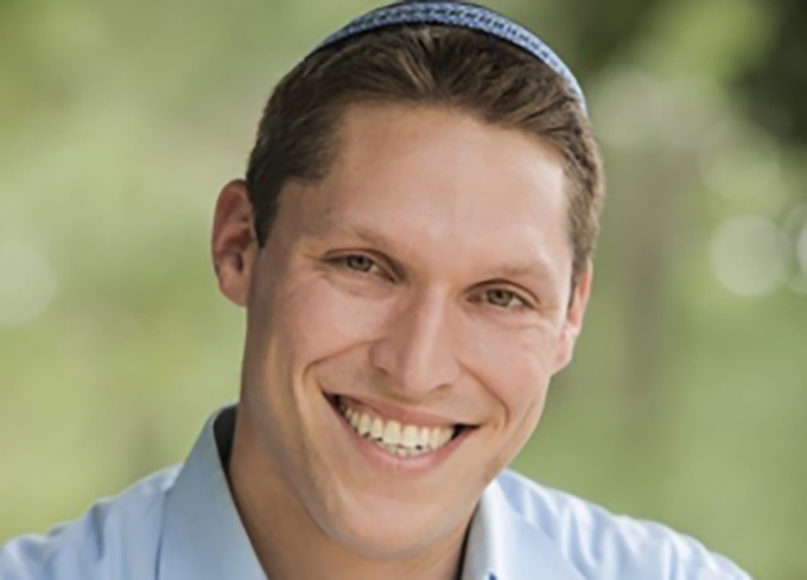
Conversation with Rabbi Dr. Shmuly Yanklowitz
By Stacey Dresner
STAMFORD – Rabbi Dr. Shmuly Yanklowitz will be guest speaker at the annual Saul Cohen–Schoke JFS Lecture, “Spiritual Transformation: Changing the World from the Inside Out,” on Thursday, Nov. 8 at 7:30 p.m.
The lecture, at the Ferguson Library, One Public Library Plaza in Stamford, is free and open to the public.
Rabbi Yanklowitz, a sought-after educator, social justice activist, and motivational speaker, is the president and dean of Valley Beit Midrash, founder and president of Uri L’Tzedek, founder and CEO of The Shamayim V’Aretz Institute, and founder and president of YATOM: The Jewish Foster & Adoption Network.
His writings have appeared in The New York Times, The Wall Street Journal, The Washington Post, The Guardian, and The Atlantic. He is the author of thirteen books on Jewish spirituality, social justice, and ethics.
During his visit, he will also speak separately to the JFS’s young professionals Jewish Twenties and Thirties group and conduct a workshop for Jewish professionals at the Schoke JFS Bridgeport office.
He recently shared information about his upcoming lecture with the Jewish Ledger.
JEWISH LEDGER (JL): The subject of your talk in Stamford is “Spiritual Transformation: Changing the World from the Inside Out.” Does that mean that we must repair ourselves spiritually before we can change or repair the world?
SHMULY YANKLOWITZ (SY): Yes, it means that, but it also means taking a broader view of the state of the world. Right now, the world faces an existential crisis of meaning. The decentralization of identity due to globalization means that many people are skeptical of the institutions that used to produce consequential interactions. For our purposes, that means faith-based institutions.
Certainly, in the Jewish community, which was already heavily decentralized, many people question the value of the systems that are already in place: What is the point of joining a synagogue? What’s the point of another young professional program? Why are we supporting Israel at the expense of local vulnerable populations? Etc. Spiritual transformation is a process that uses those questions but turns them inward. In essence, what are the parts of Judaism that are relevant to my life and give me a sense of purpose.”
Judaism is more than rituals; Judaism is more than holidays; Judaism is more than keeping kosher – though those are all important, of course. Judaism, at its best, is about building on millennia of tradition to actualize the qualities that are most needed to healing the self and the world: tikkun olam, justice, equality, and dignity.
JL: And how do we do make that spiritual transformation?
SY: There is no one approach to spiritual transformation. Everyone is on their unique journey and that means that individuals have to make their own choices about how to best apply the tradition to their lives. Despite what some authorities say, there is no monopoly on how Judaism is best practiced. Rather, there are only divulging principles about how best to practice Judaism in the world.
On a basic level, however, I recommend that people start by learning the basic concepts of middot (character development) and mussar (ethical practices). These approaches make Jewish practice tangible and immediate. These approaches are not so much about learning the minutia of Torah principles, but about the practical application of Torah wisdom in everyday life. I always suggest to those who ask me how to be a more engaged Jew to choose one or two practices and study them deeply and with good intent. Eventually, after internalizing these traits, one can begin studying another trait, and then another. So, after a while, everything begins to flow and spiritual transformation can truly begin.
JL: What would you tell people who are angry and frustrated by the current political process? What do you say to those who want to effect change but feel helpless to do so?
SY: Yes, the current situation with the government is tragic and it would be easy to give up hope. But to invoke a phrase from Jewish tradition, this is not a time to stand idly by while our neighbors, friends, and colleagues are experiencing so much pain and hurt. There is so much that can be done and so much that needs to be done. Jewish tradition has shown us time and time again the power of faithful protest against inequity and bigotry. And to those who think there is nothing that can be done because of the current political climate, I say that they are giving up too easily. Go local: find a homeless shelter that needs volunteers, reach out to a refugee assistance group, raise awareness for a local issue that you find important; this can go on. Just throwing up our hands and saying, ‘Well, there’s no way to win now’ is defeatist and myopic. There is so much that we can do, but there is so much more that you can do.
Our ancestors faced even worse challenges than us. When the Temple was destroyed, that would seem to be the logical end of the Jewish people. But despite the persecution, the humiliation, and the exile, the Jewish people endured. Why? Because we had the will to endure and overcome the challenges and reorient our perspective of existing. If they can survive, so can we.
JL: What Jewish texts might we read to help us better understand this concept or that bring us hope and encouragement during these turbulent times?
SY: Without a doubt, Pirkei Avot (The Ethics of the Fathers). I write this not because I just wrote a commentary on Pirkei Avot, but because the whole of Jewish ethical teachings can be found just within the scope of the book. This compilation of precepts presents a Judaism that is engaged with the world and understands the difficulties of navigating it while still trying to live an ethical life.
JL: In Stamford, you will also lead a workshop with a group in their 20s and 30s. Do you have a different message for them? Are they seeking this type of spiritual transformation in stronger ways that previous generations?
SY: I wouldn’t say the message of spiritual transformation for young professionals is radically different than any other population. The only difference would be in the approach. Young professional engagement is a significant part of my day-to-day job as the president and dean of Valley Beit Midrash, the Jewish leadership and learning organization I lead in Phoenix. Not to generalize, but the most critical aspect of young professional engagement as is practiced today is that many of them are burnt out from the old models of Jewish institutional interaction. Happy hours and purely social events are fine, but those cannot be the only way to reach young Jews wanting to make a difference in their community.
Rather, the most important way to reach young Jews is to empower them, reach them where they’re at, and give them the tools necessary to become change-makers. At Valley Beit Midrash, we do this through our Start Me Up! Fellowship as well as with programs and retreats designed specifically for young professionals.
It is vital Jewish communities around this nation and the world not only invest in young professional programs just to have a base of future donors. Instead, investing in the spiritual development and moral leadership development of young professionals is what is needed most of all at this critical time.
For more information regarding the annual Saul Cohen–Schoke JFS lecture on Thursday, Nov. 8, 7:30 p.m. at the Ferguson Library in Stamford, contact Lisa Rich at (203) 921-4161 or LRich@ctjfs.org.
For information on Rabbi Yanklowitz’s workshop for the Jewish Twenties and Thirties group and Jewish Professionals, conducted at the Schoke JFS, 4200 Park Ave. in Bridgeport, contact Jonathan Fass at (203) 921-4161 or email at jfass@ctjfs.org.








 Southern New England Jewish Ledger
Southern New England Jewish Ledger








